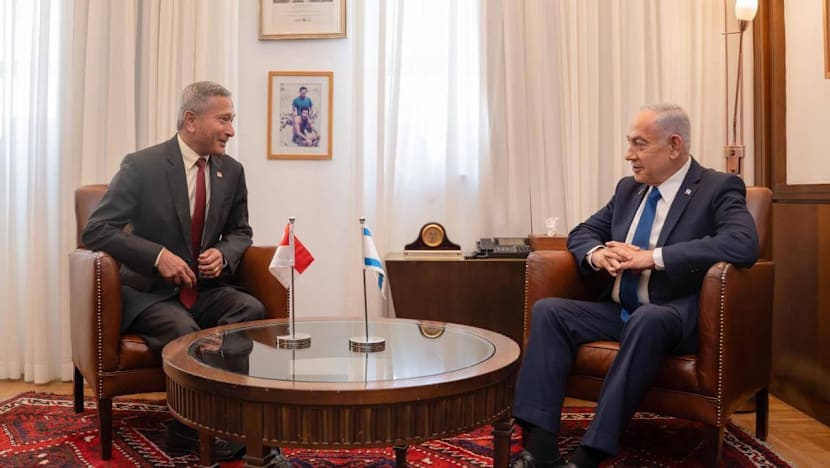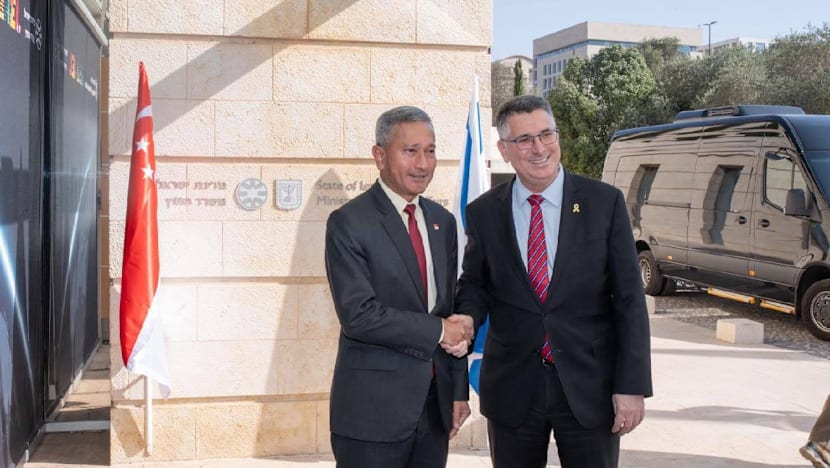Singapore conveys need for more aid to Gaza in meetings with Israeli leaders
Foreign Affairs Minister Vivian Balakrishnan said the ceasefire agreement with Hamas has given Israeli leaders more bandwidth to think beyond the urgent and immediate pressures of the war.

Foreign Minister Vivian Balakrishnan at a meeting with Israeli Prime Minister Benjamin Netanyahu in Jerusalem on Nov 6, 2025. (Photo: MFA)

This audio is generated by an AI tool.
TEL AVIV: Singapore has urged a sharp increase in humanitarian aid to Gaza and greater engagement with the Palestinian Authority during talks with Israeli leaders, said Foreign Affairs Minister Vivian Balakrishnan on Thursday (Nov 6).
He was speaking to reporters at the end of his four-day work visit to Israel and the Palestinian Territories, and after meeting Israeli Prime Minister Benjamin Netanyahu and Foreign Minister Gideon Sa'ar earlier in the day.
“We've conveyed to the Israelis that we really need to have a significant surge in humanitarian assistance. There should be no reason for any Palestinian in Gaza to be short of food or to be denied access, or have any restriction on access to medical care,” he said.
Dr Balakrishnan’s visit comes after the first phase of a ceasefire agreement between Israel and Hamas in Gaza was reached last month.
He told the Israeli leaders that Singapore would step up its contribution to humanitarian and medical aid to Gaza.
On Tuesday, Dr Balakrishnan met Palestinian Authority leaders in Ramallah, where he handed over a US$500,000 donation to help alleviate food insecurity in Gaza.
He added that Singapore had encouraged Israel to engage with the Palestinian Authority.
“The fact (is) that the Palestinian leaders in the Palestinian Authority actually do look forward to this engagement,” he said.
Dr Balakrishnan said that he also reiterated Singapore’s long-standing belief that a negotiated two-state solution is the “only viable way to achieve a just and durable solution".
“The Israeli leaders know that there's a long and difficult journey ahead, but there is also a consciousness that you can't just keep repeating these cycles of failure and violence,” he told reporters.
Achieving peace, he said, will require support from the international community, including the United Nations, as well as United States President Donald Trump and his 20-point peace plan to be implemented through a UN Security Council resolution.
“There needs to be progress in which the two peoples find a way to coexist in peace, dignity and security,” he said.

HOW ISRAELI LEADERS RESPONDED
Asked how the Israeli leaders responded to Singapore’s stance, Dr Balakrishnan said that they understood Singapore had its own view, which the leaders accepted "in good grace".
“I keep making the point that it is possible to have a relationship based on trust, and that does not mean that we have to agree on everything,” he said.
“In fact, when partners are able to express and constructively engage (in their) differences, that's when you can also look for new opportunities and for progress.”
The meetings with Prime Minister Netanyahu and Foreign Minister Sa'ar were "very candid, very frank exchanges", he added.
"Because clearly, we have some differences of views with Israel, but at the same time, because of our long-standing relationship, I was able to convey these differences candidly, frankly, robustly, but still constructively."
Dr Balakrishnan also noted that while the trauma inflicted by the Oct 7 attacks “cannot be underestimated”, the “zeitgeist is significantly different”.
“The Israeli leaders now have a bit more bandwidth to think beyond the urgent and the immediate pressures of the war, to take a longer-term strategic perspective,” he said.
“And coming from outside the region, and coming even with difference of views, but difference of views based on wishing the best for both Israelis and Palestinians, I think these were very good conversations.”
Dr Balakrishnan also reflected on his last visit to Israel and the Palestinian Territories, when the war was still in “full bloom”.
“If I compare today to March (2024), I am just that significantly more hopeful,” he said.
“All wars need to end at the end, not on the battlefield, but at the negotiating table.”















